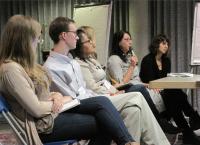Over the course of four days this fall, IPinCH team members, advisors, students, and partners gathered to celebrate the completion of the first half of the project, and to refine plans for the future. The gathering of the members of the IPinCH collective generated excitement, ideas and connections to carry us into the second, more analytical phase of our research together.
Representatives from communities involved with IPinCH—from the Arctic to Australia, from Krygyzstan to Michigan, from Chilliwak to the Chatham Islands—gave voice to their experiences with concerns about heritage issues. Students discussed being part of the project from a variety of perspectives relating to their diverse roles, from Knowledge Base Research Assistant to Working Group Co-chair. And the academic crowd discussed research progress and made plans for new collaborations.
The Case Study/Community-Based Initiatives (CBIs) held centre stage the first day of the conference. These teams are comprised of an enthusiastic mix of researchers from the community and from academia, with youth often involved, whether learning in the context a formal university program or not. Each Case Study or CBI research team reported on progress to date, with some at an early stage, and others complete except for a Final Report. To assist in report preparation, Steering Committee member Catherine Bell took the opportunity to elaborate on Case Study Final Reports, defining the range of audiences who will access them, and considering the types of content useful to those audiences. Each team received a copy of Bell and Val Napoleon's edited volume, First Nations Cultural Heritage and Law: Case Studies, Voices, and Perspectives, which provides examples of the type of reporting expected.
There was also much discussion with and about Working Groups, many questions arising about initiatives groups would embark upon in this second phase of the project, as well as how team members could become involved in those. We now have two new Working Group Co-chairs. Dave Schaepe from the Stó:lo Research and Resource Management Centre stepped in to join Lena Mortensen in chairing the Cultural Tourism Working Group, which she has been piloting single-handedly for more than a year. Ian Lilley, who asked at the start of the conference how he could be more involved in IPinCH, found the answer in becoming the Co-chair of the Sourcebook and Community Tool Kits Working Group, when Steering Committee member John Welch stepped aside due to a heavy workload.
There were also many special presentations and sessions at the conference. These included:
• Julie Hollowell's video introduction of our project ethnographer Alexis Bunten, who is compiling and analyzing information on IPinCH activities, interactions, and knowledge flows to help us improve our project; Alexis spoke of the nature of her role, and of her plan to connect with as many team members and partners as possible at the conference (and later with absent team members);
• A workshop on Consent Practices and Free Prior Informed Consent (a special session organized by Brian Noble and Emma Feltes of the Collaboration, Relationships and Case Studies Working Group) with presentations by Michael Asch, Brian Noble, Arthur Manuel, Emma Feltes, Debra Harry, and Nicole Schabus;
• An overview of the Knowledge Base and how to use it, including a stellar example from the Ethics and IP Working Group, presented by Dru McGill, Davina Two Bears, Annique-Elise Goode and Kelly Fox. Ethics and IP Working Group research assistants Dru and Davina reprised their section for the SSHRC Review Committee on the final day of the conference;
• A panel discussion on the IPinCH student experience; and
• Special Presentations on the final day:
• New Ainu Policies in Japan by IPinCH Partner Teruki Tsuenmoto.
• Recognition of Intangible Cultural Heritage in Peru by IPinCH Associate Alvaro Higueras.
• A Critical Heritage Studies Approach to IPinCH Case Studies by IPinCH Post-doctoral Fellow Melissa Baird.
• IP and the Native Giftware Industry in BC by IPinCH Graduate Fellow Solen Roth.
• Talking Circle on “What Can IPinCH Produce that is of Benefit to Youth and Elders?”
A webarchive containing videos of more than 33 individual conference presentations is now available to IPinCH team members and associates. These on-line videos provide a great opportunity for those unable to attend to partake in many of the rich offerings of the conference, as well as for those who were there to have second (and third) viewing (http://tlcentre.sfu.ca/archive/ipinch-conference/ George emailed the username and link on October 27 or ask ipinchpm@sfu.ca).
Feedback from our time together alerted the Steering Committee to challenges as well as affordances, and with some lessons learned, the Committee is now engaged in bi-monthly teleconferences to address issues and provide support as we move forward together. As outcomes of the teleconferences become concrete, more information will be disseminated via the website, digest, newsletter and mailing lists. Further feedback from members of the collective is still welcomed.






